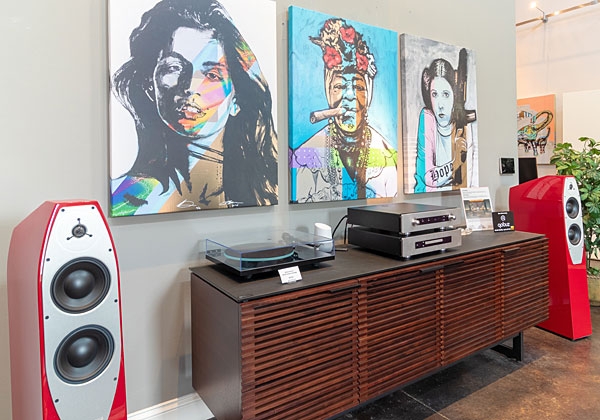| Columns Retired Columns & Blogs |
Encouraging article!
But, I think you may have meant > https://houseofstereo.com

Jacksonville is unusually well-served for a city its population size. It is home to three audio dealerships, all started in the 1960s: House of Stereo, Hoyt Stereo, and Behrens. The three owners "grew old together," Joe Parvey, the business's new owner, told me in a telephone interview.
Bill Gibson founded House of Stereo in 1969 and ran it for almost 50 years. When, in 2018, he decided to retire, the store's future was in doubt.
Parvey was a local kid who grew up visiting House of Stereo with his father, who is friends with Gibson. Parvey became interested in reproduced music: first home theater and then, when he hit his 30s, two-channel audio. He attended the Fox School at Temple University and studied international business and then established a career as a data center and operations specialist. By the time he left that industry, he was a "disaster recovery/cloud infrastructure architect." Meanwhile, he started to dabble in audio servers—a different kind of data center, you might say, on a smaller scale. Around 2013, he began taking server prototypes to House of Stereo to test them with Gibson's high-end systems. A couple of years later, he started up his own company: Wolf Audio Systems.
"If I didn't have a [good-paying] corporate day job, I wouldn't have been able to afford the R&D to make them better," he said. He had another asset: "a lack of fear when it came to digital, with playing around with new technologies. People can be afraid of technology." He wasn't.
Parvey bought House of Stereo in 2018 and moved the store to a bigger space, now shared with Wolf Audio Systems. The combined facility takes up five of seven storefronts—6900 square feet in total—in a building in an older area of town that's being revitalized. The store reopened in 2019, but construction is still ongoing because the pandemic slowed things down. The building will house a large showroom with listening rooms, Wolf operations, and a new service center for general audio equipment, including Wolf products. People who bring products in for service, Parvey thinks, are potential customers, "seeing new equipment and hopefully rekindling their passion."
Since he'd first set out as a manufacturer, Parvey said he's been learning the retail part "on the fly." Before he took over the store, he and his brother took a road trip—a reconnaissance mission—visiting hi-fi dealerships up and down the East Coast. (Parvey said his brother, David, who lives in Philadelphia, is "instrumental in House of Stereo's marketing and operational activities.") "It gave me a lot of insight," he said. "It was obvious that at some point in the late 1990s/early 2000s, high-end shops became like museums." Not in a good way, but in the untouchable, out-of-reach sense, like precious artifacts cordoned off or behind glass. Too many dealers carried only ultra–high-end products, he said—nothing to bring in newer customers with more limited budgets.
"We needed to carry these less expensive things," he said. "We needed to have a place where people could go see them." People who buy less expensive gear now will buy pricier stuff in a few years—some of them will, anyway.
Many dealerships have "coasted" and languished, Parvey said. Parts of the industry have become outdated. "I think it's everyone's challenge: Bringing such an analog business into the modern age"—analog as in old-school, not as in turntables vs DACs. Online sales, for example, bringing in new lines and product categories, and modernizing the stereo shop. "One reason we don't have as many 'hometown' dealerships is because they can't or don't want to compete with online [sales]," he said. "So there's the challenge of that hybrid model. Because of the web, you are competing nationally." A surprising number of House of Stereo's brands—Arcam, Audiovector, Ayre, Magnepan, Oracle, Parasound, Rega, T+A—are offered for sale at houseofsound.com, some subject to territorial restrictions.
"We're already well on the path of online sales, and people making buying decisions based on YouTube videos," he said. Parvey believes there's a psychological price threshold—say, $5000, maybe up to $10,000 for some people—up to which people will buy online. Beyond that threshold—whatever it is—people tend to travel to a dealer, or maybe an audio show, before they make the purchase.
Another big issue for today's audio stores is custom installation, an area of the business that has grown in recent years, even as hi-fi has shrunk. At House of Stereo, it's apparently an important part of the business mix. "We have been featured in various national and regional magazines such as Audio Video Interiors, and are recommended and used by the area's top builders, architects and designers" says the "About" page on the website.
Finding new ways to educate new customers is essential, to help foster interest, Parvey told me. Lately, he's seeing new customers from a broader demographic, such as the woman in her 30s who recently bought a $1000 turntable. Couples in their 30s and 40s are common. He's optimistic: "We're entering another little golden age of hi-fi."

Encouraging article!
But, I think you may have meant > https://houseofstereo.com

What a small world. Previous story, Re-Tales #10, was about Hanson here, where I live in SW Ohio. And now this... in Jacksonville, where I grew up and return once a year to visit my parents.
I've visited House of Stereo twice (2019 and 2020) and had a great time. Diverse selection of product at various price points, but during my 2020 visit they still were not in the new space, which I had been given a tour of in 2019.
It really was rewarding to visit a brick-n-mortar in this online world, and I really wish the very best of luck and success to their endeavor.